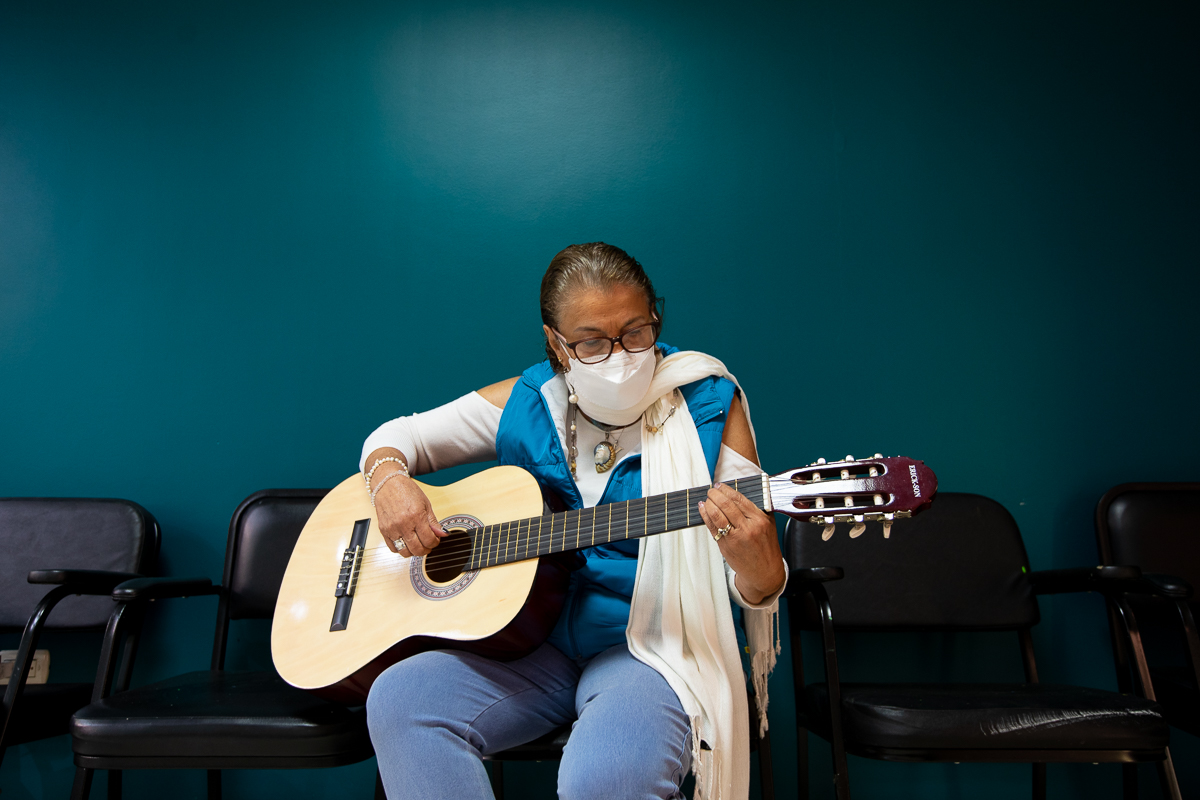One morning in April 2021, Ana Cordero Cordero, who was 79 years old at the time, took her smartphone and wrote a message to the almost 50 WhatsApp contacts with whom she communicates regularly:
“Thank you for your messages. I’m back. I was in the mountains with my sister, my niece, and her two beautiful children. I didn’t have access to Internet, but I always had you in my thoughts. A thousand blessings for your messages, videos and audios. I am watching them now.”
That message was followed by a private one where Ana, my aunt—who didn’t join the world of the internet until after the death of her husband in 2019—told me this: “Mónica, how terrible, more than 263 messages, videos and audio.” She was referring to everything she had to review to catch up with her community.
She knew that this was going to happen, because by then she had set up five distribution lists on WhatsApp, divided into friends, neighbors and family. For months, she’d been creating special motivational messages tailored to each group and sending them every morning and every night, without fail until that short April break.
Learning to use her cell phone and a tablet that her sister gave her has brought much more to her life than sending messages, or the ability to watch her soap operas on YouTube when she misses an episode.
“[Without using WhatsApp] the day would be much longer. I spend a lot of time on this,” she says about her online conversations, which she confesses she prefers to do with audio messages. “This makes me very happy because I can find out if someone is sick, what happened to that person, where people are. I am stuck inside the house, but I am in constant communication with the whole world.”
Like Ana, thousands of older adults take control of their learning and have lost their fear of new frontiers such as Information and Communication Technologies (ICT), thus improving their lives.
But what is the real impact of doing this exercise of learning new things? And does this practice have positive benefits outside of old age?
Cognitive activity and disease prevention for seniors
The morning of activities at the El Tejar Day Center for Elderly Persons in El Guarco, Cartago, begins on this Thursday in February with a short talk on the cycle of violence: what it is, how it develops and how to detect it. This is the second installment of the educational talks scheduled for Valentine’s Week. They began with assertive communication and will end with a look at legal actions to stop cycles of violence.
This is a place where learning new things is taken very seriously.
The morning continues and everyone goes about their own business: guitar classes, a craft workshop organized by the older adults at the center, physical therapy, English classes, and cognitive exercises in the Cognitive Stimulation Center room. That’s where I stop to watch a little longer.
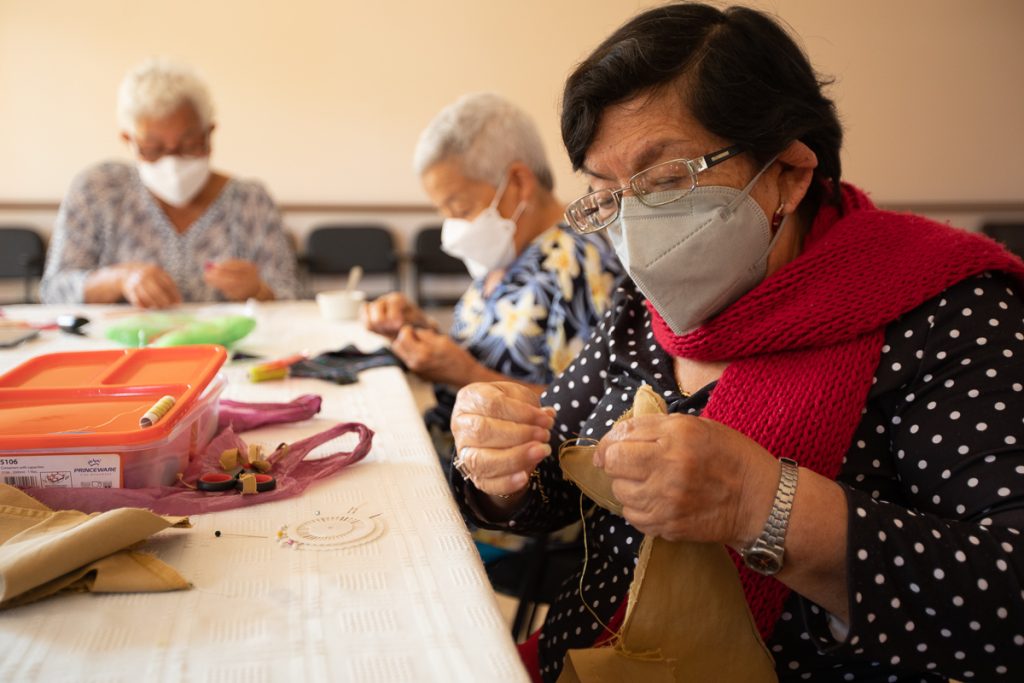
“If you start working 20 years earlier at a preventive level, you can slow down the onset of the disease. It can slow down the speed at which the disease progresses,” explains the center’s psychologist and gerontologist Eduardo Carrillo Valle. He’s describing why it is so important that all adults do these exercises to prevent various kinds of dementia.
Eduardo, an occupational therapist, and several university students accompany older adults while they solve word and number searches, paint by numbers, and solve Tetris-type games, math games, and vocabulary challenges, among many other activities.
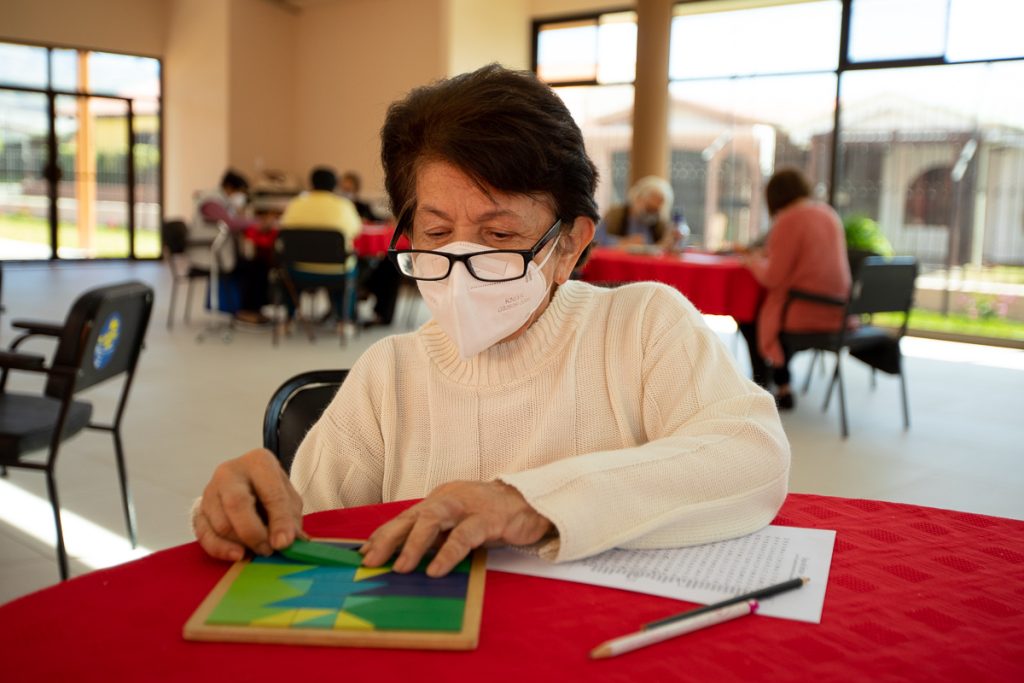
“When the disease or deterioration is already there, you can work and the person will have benefits, but the broadest benefit and the greatest value is given by working from prevention,” adds Eduardo, emphasizing that there is no cognitive work that can cure dementia. You can only slow down the speed at which it progresses.
As we watch all these people poring over their documents, I can’t help but wonder if I should be doing the same thing every day.
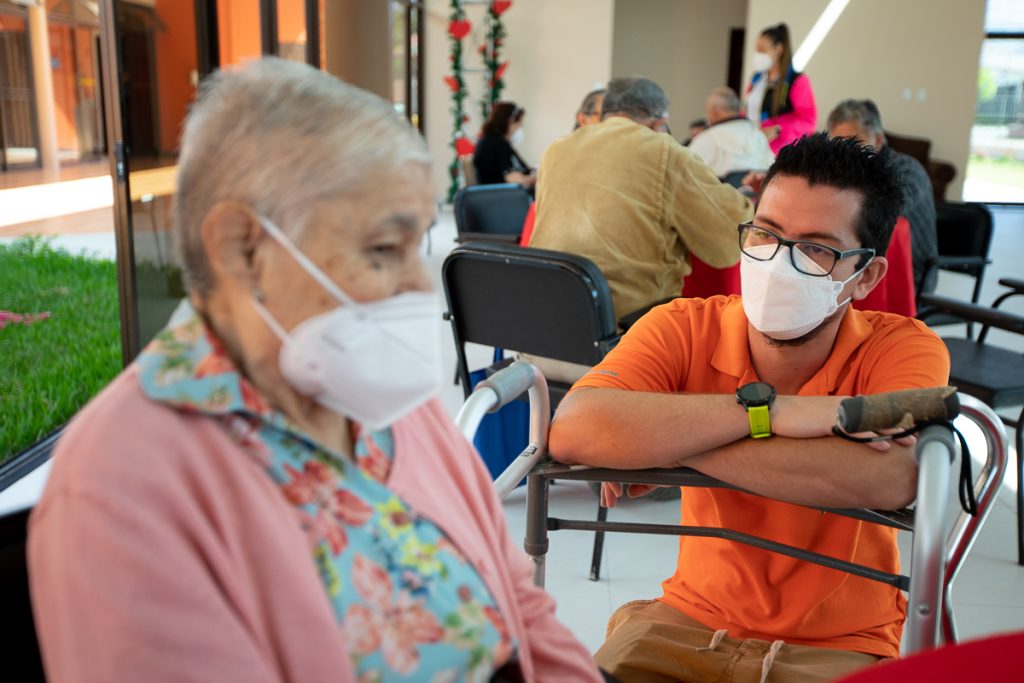
“The ADI (Alzheimer’s Disease International) says that there are five things that one can do that reduce the chances of having cognitive impairment and eventually Alzheimer’s and other dementias,” answers Eduardo. Then he goes through the list: socialize assertively, have good eating practices, do physical exercise, take care of cardiovascular health to avoid cardiovascular accidents that can affect your brain, and do cognitive activities.
“But it’s not just getting to do activities like word search or a crossword puzzle,” he continues. “It is about engaging in activities that require us to learn new things, such as learning a new language, a musical instrument, or new trades. The more I have an approach to doing different, varied things that require my brain’s attention, use of memory, that is strengthening cognitive processes, the better the results.”
He points out that in addition to learning something new, we must enjoy it. That is something I see in every corner of the room we are in.
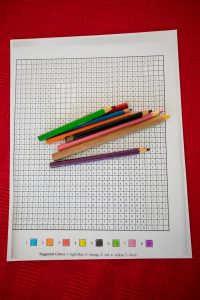
“You get on the bus and nothing hurts anymore,” says Norma Monge Elizondo, 74, who has been participating in the center’s activities for three years. Norma is sitting at a table with two other women, carefully painting a sheet full of squares and numbers. The paint-by-numbers exercise requires her full attention.
“We are not going to prevent aging. That cannot be avoided,” says Eduardo Méndez, executive director of the center. “But we are going to slow down that process of cognitive deterioration that people can suffer, because aging can bring it on.”
During the interview, the director reflects on various threats we experience as we age, especially today, when advances in medicine and public health have allowed us to have very long life expectancies.
“We are going to live longer, but there is a huge difference between becoming a dependent older adult and not being one. It’s up to you to age well.”
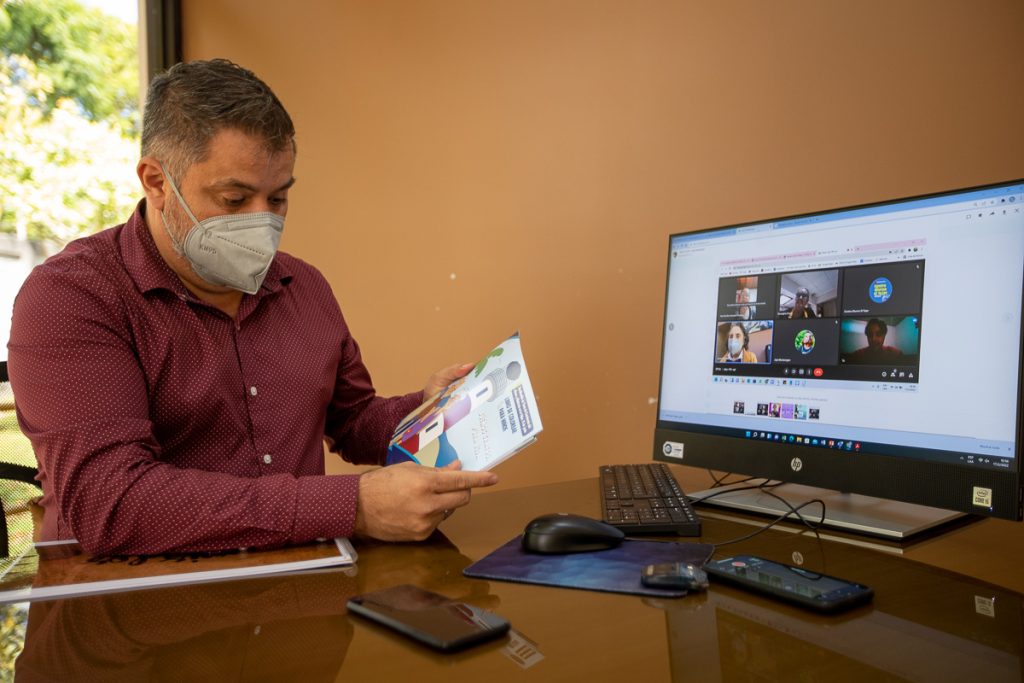
What the COVID-19 pandemic revealed about learning
“I think that for older adults, for this generation that has had to live through the pandemic, nothing can stop them now,” says Eduardo, the director. “They can now say ‘We have been through the worst, and we made it out okay. We beat the pandemic and entered the digital world.’”
It is difficult to generalize—especially because the digital divide and access to opportunities affects the entire population, with or without a pandemic—but it is true that many older adults have shown resilience during this global crisis.
A 2020 study by the National University (UNA), the Ministry of Health and several foreign universities (Impact on Mental Health on Older Adults during the COVID-19 Health Emergency in Costa Rica) concluded that the older adults interviewed, despite the pandemic, “had high scores for coping skills such as positive thinking in the face of adversity, self control and resilience and feelings of personal efficacy.” They also “reported maintaining high satisfaction with their current life.”
In addition, 88.5% of people used communication technologies to keep in touch with family and friends; 79.8% used it for entertainment; and 59.2% used it for activities such as purchases, medical appointments, or payment for services.
“The pandemic has boosted the visibility of why it is important to include older people in digital literacy,” says María Dolores Castro Rojas, one of the researchers from the UNA School of Psychology who participated in the research. María Dolores has specialized in the use of ICTs for the cognitive development of the elderly.
“Digital exclusion is a violation of the rights of older adults,” she says, arguing that it limits enjoyment of social participation, education, and health, “because even health services have had to be digitized.”
María Dolores touches a sensitive nerve: the pandemic has digitized spaces for older adults. Although many like Ana have managed to learn about ICTs, there are many others who can’t afford to be left behind.
Why? Because this is a reality that will not change. Even people who feel up to date with technology today could experience that digital gap in the near future as technology continues to evolve.
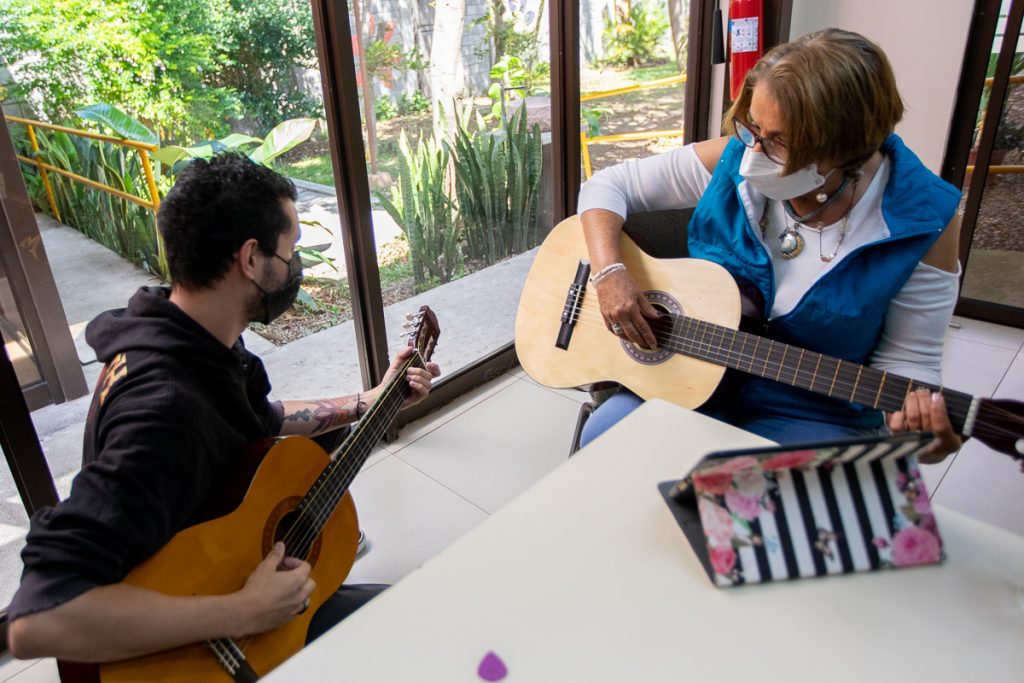
“The process of leaving the workplace can mean becoming outdated,” explains María Dolores, noting that digital literacy and learning new technologies is important for all people of all ages. It can also support cognitive development and healthy aging.
In the case of the El Tejar Day Center, virtual classes and workshops began in March 2020.
“At the beginning there was resistance, but here we insist a lot on technology,” says Eduardo Méndez. He adds that at one point the center had a computer room, but they decided to change course and teach people how to use a phone or tablet instead.
The virtual workshops that began during the pandemic continue today, along with in-person activities—for example, English classes. New spaces have has been created, such as the El Jolgorio, where three times a week older adults from anywhere in the world can receive news, educational information and perform cognitive exercises by watching the broadcast on Facebook or YouTube.
Another example of this transformation is the Institutional Program for the Adult and Older Person (PIAM) of the University of Costa Rica (UCR). For 35 years, this program has offered courses for people over 50 years of age. Some classes include university undergraduate students, and others are designed exclusively for this population.
During the first semester of 2020, more than 2,700 people had enrolled in a PIAM course. When classes shut down due to the pandemic, all these activities were put on hold until the community’s demands were clear.
“It turned out that older adults are also interested in virtual courses,” says María José Víquez, education advisor for the program, recalling how PIAM was forced to reinvent itself in order to meet the needs of its community. “If we didn’t continue, twice as many people were going to be left out.”
She explains that registration for virtual courses was less than half what the program usually receives, but even so, they decided it was essential to offer virtual options.
“[The pandemic] opened up possibilities that no one had considered,” she adds, referring to the opportunity it provides for older adults can overcome the digital and technological divide and participate in virtual activities. “It opened up so many opportunities that this demands more of us.”
This year, PIAM will return to in-person classes, but some students and instructors want to continue with virtual education, especially those who do not live near the university campus and have never been able to participate in PIAM before.
“Digital literacy must be an ongoing thing,” says María José.
Learning throughout life
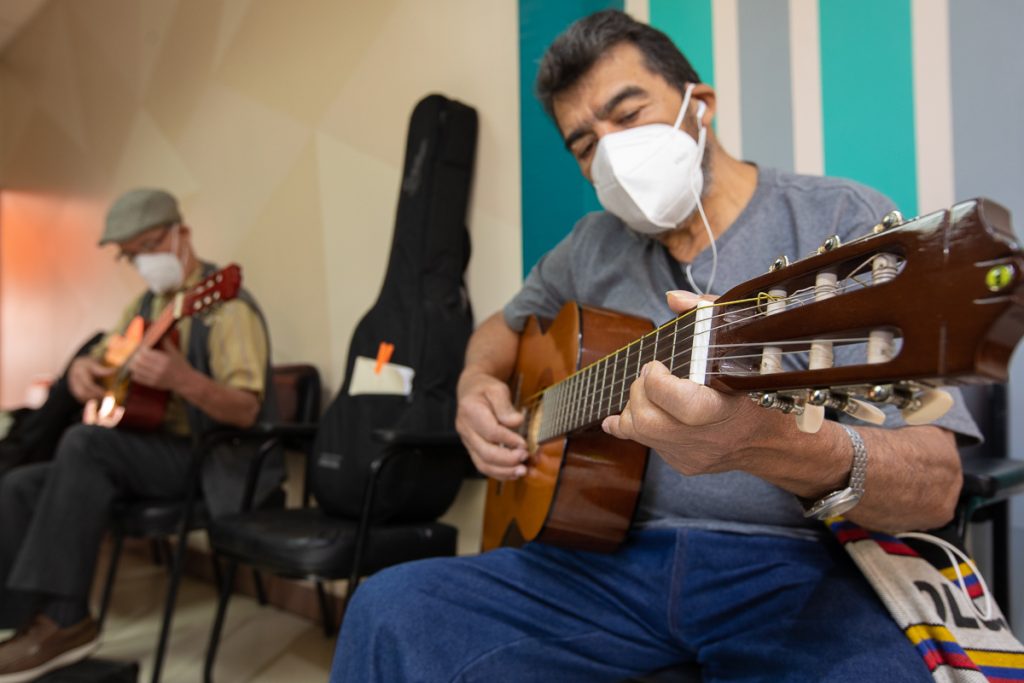
In a room at the El Tejar Day Center, three men and a woman tireleslly strum their guitars from 9 in the morning until 12 noon. Six weeks ago, they started a course with Oscar Muñoz Barbosa, a future music education teacher who fulfills his university community service requirement (TCU) by giving this workshop at the center.
“I’d touched it, la había tocado, but I had never made music with it,” jokes Orlando Maroto Aymerich, 81, when I ask if he’d ever played the guitar before. Almost two months ago, Orlando borrowed his grandson’s guitar to attend the workshop, and now it’s practically his.
“I had always wanted to learn,” he says. “It has always captured my attention to see those who know how: trios, concert orchestra players, when they do a solo.”
Unlike Orlando, María Victoria Fernández Padilla, 80, had already learned to play a little from another member of the day center before the pandemic. Her friend recently died, so she took the opportunity of the workshop with Oscar to continue her training. On this Thursday, she brings YouTube videos of songs she wants to learn to play.
As I admire this roomful of determined aspiring guitarists, I realize that it’s not too late for me. Around 25 years ago, my father gave me a guitar, and I still don’t know how to make music with it. But it doesn’t matter. Oscar, Victoria and the others in that room, just like my aunt Ana and her recent foray into onlinecommunication, have shown me that it is always a good time to learn something new. What’s more, we must make an effort to continue learning new things as adults or older adults.
“I think that’s the lesson they give us,” says Oscar at the end of his class. “At any time, you can start learning. The important thing is to start.”


